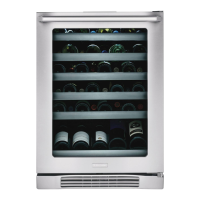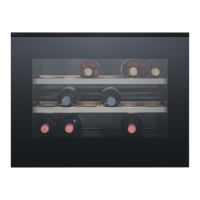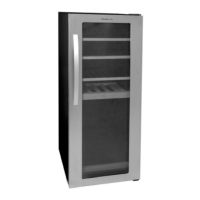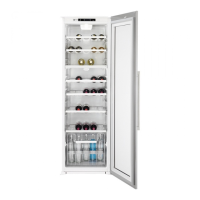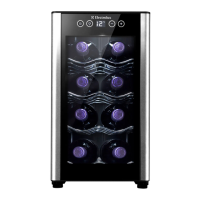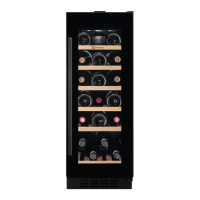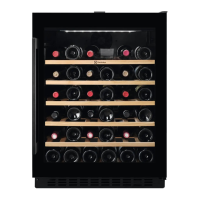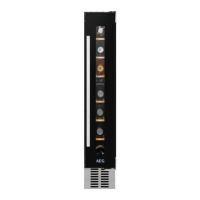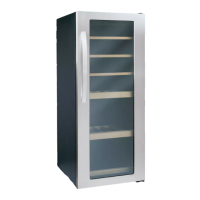
Do you have a question about the Electrolux Wine Cooler & Beverage Center and is the answer not in the manual?
| Brand | Electrolux |
|---|---|
| Model | Wine Cooler & Beverage Center |
| Category | Wine Cooler |
| Language | English |
Standard color coding for safety ground wires is GREEN or GREEN with YELLOW STRIPES.
Safety items are labeled with Danger, Warning, or Caution based on the risk type.
Includes precautions like child entrapment risk and safe handling of appliances.
Details free-standing or built-in installation requirements and clearances.
Provides specific width, height, and depth measurements for the unit.
Covers positioning, power requirements, GFI avoidance, and local codes.
Step-by-step instructions for changing the door swing direction.
Periodic cleaning and proper maintenance ensure efficiency, top performance, and long life.
Guidance on cleaning stainless steel, what to avoid, and recommended products.
Steps for cleaning the interior using mild detergent and warm water.
Instructions on how to remove and reinstall wine racks using ball bearing slides.
Details two methods for removing and reinstalling glass shelves.
Explains the importance of proper grounding and receptacle types.
Details the PTC relay, overload protector, and run capacitor for compressors.
Describes the PTC resistor's function as an on-off switch in the relay.
Procedure for checking and replacing the solid state PTC relay.
Description and procedure for checking/replacing the overload protector.
Description and procedure for checking/replacing the run capacitor.
Explains how the compressor starts using the PTC relay and run capacitor.
Describes how the run capacitor improves compressor efficiency.
Details how the compressor circuit operates under different conditions.
Procedure for checking compressor electrical connections and voltage.
Instructions on how to adjust the unit's temperature setting.
Guide to entering and navigating the unit's service diagnostic mode.
Explanation of features like vacation mode, mute sounds, temperature mode, display light, and on/off.
Details door ajar, high temp, and power fail alarms and their indicators.
Explanation of how to enable/disable Sabbath mode and its functionality.
Lists error codes for primary sensor, evaporator sensor, and communication issues.
Procedure for locating and replacing the main printed circuit board.
Information on evaporator fan operation and removal for Beverage Center and Wine Cooler.
Step-by-step guide to removing the evaporator fan motor and cover.
Defines terms: Recovery, Recycling, and Reclaim of refrigerant.
General warnings for testing compressors and charging sealed systems.
Cautionary advice for testing compressors to prevent damage and hazards.
Warnings about overcharging systems, leading to pressure buildup and potential rupture.
Safety warnings and procedures for soldering refrigeration joints.
Lists the basic components of a refrigerator's refrigeration system.
Explains the continuous cycle of refrigerant evaporation and condensation.
Symptoms and effects of refrigerant loss or undercharge.
Procedure for finding and repairing refrigerant leaks.
Cautionary note before replacing a compressor, checking for contamination.
Instructions for flushing the system, recommending dry nitrogen.
Detailed steps for flushing the system using dry nitrogen.
Procedure for flushing the system using refrigerant, with recovery requirement.
Guidance on selecting, installing, and preparing new R-134a compatible compressors.
Notes on handling cold compressors and avoiding system contamination.
Step-by-step guide to replacing the compressor, including recovery and brazing.
Guidelines for replacing the filter-drier, emphasizing not to unbraze.
Procedure for removing and replacing the evaporator and suction line.
Critical information on refrigerant types, dedicated equipment, and hose specifications.
List of specialized tools and equipment required for refrigerant evacuation and charging.
Steps for correctly connecting the service equipment to the system.
Detailed procedure for achieving the required vacuum level for R-134a systems.
Instructions for charging the system with refrigerant, including waiting periods.
Steps to prepare the charging cylinder for refrigerant transfer.
Procedure for performing leak tests on both low-side and high-side components.
Crucial step to check serial plate for correct refrigerant type (R-134a vs R-12).
Requirement for dedicated equipment for R-134a to avoid contamination.
Details on R-134a system characteristics and differences from R-12.
Information on Ester oil compatibility and its interaction with R-134a.
Explains problems caused by water and the importance of proper evacuation.
Essential maintenance for vacuum pumps, including oil changes and compatibility.
How leaks affect R-134a systems and procedures for moisture removal.
Methods and types of detectors for pinpointing R-134a system leaks.
Comparison of R-134a properties with R-12, including ODP, GWP, and vapor pressure.
A chart correlating pressure and temperature for HFC-134a and CFC-12.
Details HFC-134a combustibility, leak testing, thermal decomposition, and safety precautions.
Covers bulk delivery, storage, filling, charging, and recovery operations for refrigerants.
An overall diagram showing the system components and their interconnections.
An exploded view showing the main cabinet components and hardware.
An exploded view illustrating the parts of the appliance door.
Steps for accessing and removing evaporator fan motors from the drawers.
Procedure for removing the user interface board from the drawer unit.
Description of the LED lighting system, its wiring, and operation.
Location and access information for the main printed circuit board.
How to enter and navigate the service mode for diagnostic tests.
Details various diagnostic tests available in the service mode.
